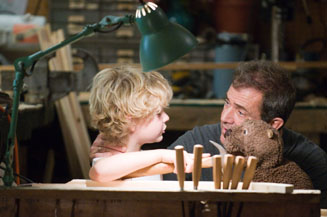Movie Review: The Beaver
By Matthew Huntley
May 12, 2011
BoxOfficeProphets.com

Given this situation, the thought that immediately jumps to mind is that this man is crazy (as is the film’s premise), but for anyone who’s ever experienced depression, they know all too well it’s an illness that can leave its victims feeling so hopeless and empty, and without an identity or purpose, that they’re willing to do whatever it takes to get better. If speaking through a puppet is one way of doing it, well, that’s what they do, no matter what anybody thinks.
The Beaver could have played as a traditional human drama in which the man finds himself in a funk, bounces back with the aid of a puppet, and then realizes he doesn’t need it anymore because of the love and support of his family. That happens to a degree in the film, but one thing Foster and screenwriter Kyle Killen are mindful of is that things aren’t that easy. The film takes depression seriously and though our first instincts are to laugh at a movie called The Beaver, it eventually grabs hold of us because we realize and appreciate how much it knows its own subject.
The film stars Mel Gibson as Walter Black, the CEO of a toy company he inherited from his father. Walter’s business has been steadily declining, as has his relationship with his wife, Meredith (Foster), his eldest son, Porter (Anton Yelchin), and his youngest, Henry (Riley Thomas Stewart). What’s interesting, and honest, about the film is that it doesn’t offer a simple explanation of why Walter has stooped into such a depressed state of mind. There’s no clear cut reason why he wants to sleep all the time or drink himself to death in a hotel. The film knows depression can’t always be rationalized. It also knows it can’t always be treated with medication and self-help books.
So Walter devises his own treatment when he finds a puppet in the dumpster and starts talking to it and as it. The beaver promises Walter he’ll find a way for him to get better but that he has to stay disciplined. Now, we’re not quite sure whether Walter is aware he’s talking to/as a puppet, or if his mind has just become so jaded it’s made this decision on its own, but it’s probably better the film doesn’t provide a concrete answer (Walter is probably not too sure himself). What matters to us is whether this story, given its most peculiar premise, can be told effectively and truthfully, and Jodie Foster proves that with the right care and sensitivity, it can be.
Not that there aren’t a few missteps. In an uneven subplot, Porter develops a relationship with Norah (Jennifer Lawrence), his high school’s valedictorian. Porter has built quite a reputation and income for writing other students’ papers and she’d like him to write her graduation speech.
The reason I call this development uneven is because Porter’s story obviously parallels Walter’s, but we’re not sure why. Is it suggesting that Porter is heading down a path similar to his father’s? Why cross-edit shots of Walter getting ready for work with shots of Porter getting ready for school? Are we supposed to assume depression is hereditary, or is it a hint that at one point Walter did the same things Porter is doing, which might have triggered his current mental state? The connection isn’t clear and doesn’t seem particularly necessary other than to show that Walter and Porter are alike, no matter how much Porter doesn’t want to admit it. He sticks post-its on his bedroom ceiling that list all of Walter’s traits and idiosyncrasies, and whenever Porter finds himself acting like his dad, he literally puts his head through the wall.
This subplot might have worked if it was given more screen time and allowed to make a stronger connection with the rest of the story, but it feels incomplete. This ties in with what I believe to be the film’s biggest flaw: it’s too short. I wanted more from it, particularly scenes devoted to Walter’s family and colleagues examining and questioning his behavior more intently.
They react to his talking through a puppet the way characters in movies do, not the way real people do. Granted, this is a movie, but because it’s so earnest with the way it views depression, why couldn’t it be just as real about the way it sees Walter’s actions? I mean, the guy is talking with a beaver puppet for crying out loud! Don’t you think somebody would speak out a little more and start knocking on his head, saying, “Hello, anybody home?” Everyone just seems too willing to accept it. Were Walter’s past treatments so outrageous that something like a talking beaver seems tame by comparison?
I also found it unbelievable that things changed for Walter so quickly after he started talking with the puppet. Within a day, he’s laughing and having dinner with his family; he’s fixing the faucet; he’s making love with Meredith; and he’s developing a new beaver toy that starts selling out. The film seemed to jump to these points too fast, although I did appreciate that Walter’s treatment was seen as temporary, which is further evidence the film knows what it’s dealing with.
Ultimately, The Beaver earns its emotion and drama, and aside from an artificial shot that shows two characters running off in slow motion, the ending feels right and true. Jodie Foster has crafted an odd story for sure, but it’s odd in a good way. The cast, led by the still versatile Gibson, is strong and committed, and it means something when my biggest complaint about the film is that it doesn’t go on long enough.